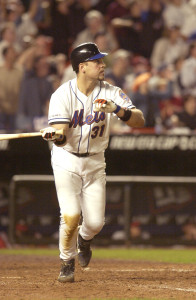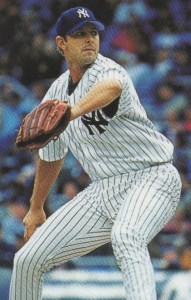No one will soon forget how our nation was devastated in the immediate aftermath of the Sept. 11, 2001 terrorist attacks.
It’s amazing to think that 12 years have passed since that day, but to so many people, it still feels like yesterday.
We’ll never forget how the nation united in the days and weeks after the attacks. And while it was minor in the grand scheme of things, sports fans will never forget the impact of New York Mets’ catcher and Brooklyn diocesan hero Mike Piazza’s healing home run.
On Sept. 21, 2001, the Mets hosted the Atlanta Braves in the first professional sports game back in New York after the attacks. The city needed some sort of distraction, and Piazza provided just that with a clutch two-run homer in the eighth inning, which propelled the Mets to victory.

Piazza has been asked countless times about the significance of that home run – which has been called the “Healing Power of a Swing” – and he always responds that he prayed to God to give him the strength to do his best in that moment.
But what about the perspective of the Braves that fateful night? It must have been tough to be in that situation. Atlanta held a 5.5-game lead in the standings over the Mets heading into that game, so the Braves had to make sure the Mets would not catch them for the division title.
And what about the pitcher who gave up Piazza’s home run? If anyone were going to be the hero in that moment, it fittingly would have been Piazza – the Mets’ perennial All-Star.
It turns out that the pitcher was Braves’ right-handed reliever Steve Karsay, who grew up in College Point, just 15 minutes from Shea Stadium – the site of the Sept. 21 game.
Karsay pitched at Christ the King R.H.S. from 1986 to 1990. The Royals won the 1988 city championship with a pitching staff of Karsay and lefty Allen Watson, who pitched eight seasons in the big leagues.
As a native New Yorker, Karsay said the whole experience of playing at Shea Stadium after the terrorist attacks was very emotional, especially during the pre-game ceremony. Normally hated rivals, the Mets and Braves embraced on the field right after the National Anthem, which featured bagpipes to honor the fallen heroes.
“We (the Braves) felt a little bit different at the time knowing the significance of that game,” Karsay said. “Having the crowd be into a baseball game at that time seemed kind of strange to me.”
However, once the first pitch was thrown, Karsay said the Braves were focused solely on winning the game. The two teams were locked in a pennant race after all.
As the game progressed though, Karsay again started feeling the emotions of the situation, especially seeing all the police officers, firefighters and emergency service personnel in the crowd.
“You see the atmosphere, and you get chills,” he said. “That’s what you felt like in the game.”
The Braves broke a 1-1 tie in the top of the eighth inning when right fielder Brian Jordan delivered an RBI double to left center field. Atlanta manager Bobby Cox then phoned to the bullpen for Karsay to pitch the bottom of the eighth.

Karsay retired Mets’ right fielder Matt Lawton to start the inning, but he then walked second baseman Edgardo Alfonzo on a full-count pitch. He said he was mad at himself for allowing the tying run to reach base with the dangerous Piazza stepping to the plate.
Karsay started the at-bat off to the Mets’ slugger by painting the outside corner with a 97 mph fastball for strike one. He figured he could try to sneak another fastball by Piazza in the same spot, thus setting up a breaking pitch to try to get an out.
But Piazza had different plans. He crushed Karsay’s offering off the stadium’s camera tower in center field. He gave the Mets the lead, but more importantly, Piazza’s homer turned the attention away from Ground Zero – even if just for a short time.
“After he hit it, for me looking back, it was the kind of emotion that rivals the loudest cheers I’ve ever heard on a baseball field,” Karsay said. “To have that moment uneased the crowd. During the game, it was tense. You can just feel what that home run meant for the healing of New York City.”
No pitcher goes into any at-bat wanting to give up a home run. But seeing what that home run meant to so many people looking for an escape from reality, the native New Yorker Karsay embraced Piazza’s “Healing Power of a Swing.”
“If there was any time to give up a home run, though I obviously didn’t want to,” Karsay said. “That was the time.”
